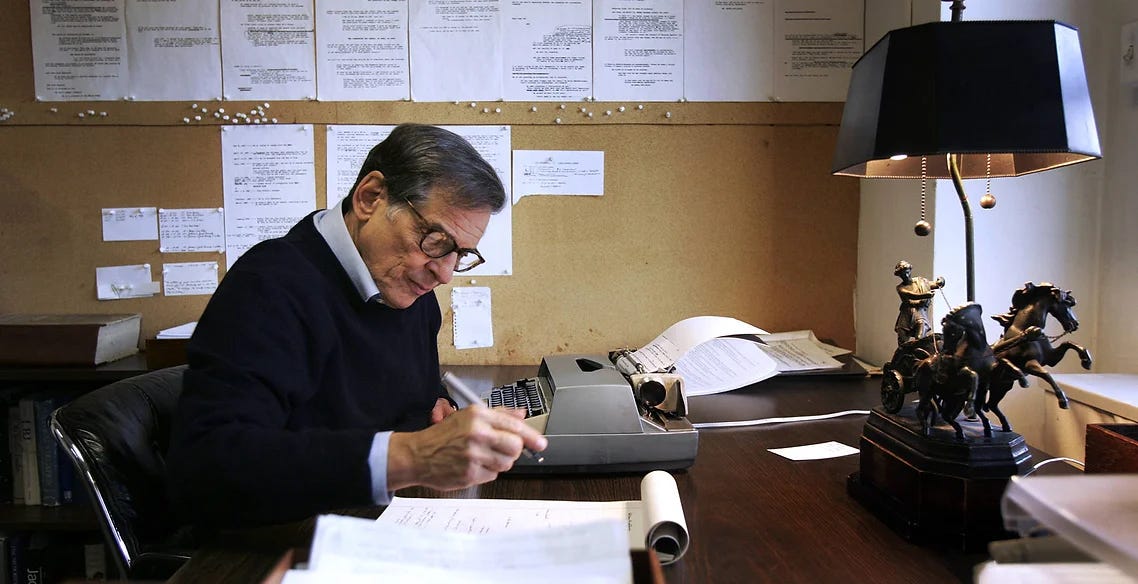The Caro Method
The Practical Polymath #97
Hi friends,
Yesterday, I took the day off to see an exhibition celebrating the 50 years of The Power Broker, a book about the infamous Robert Moses and how he shaped New York without ever being elected. The second floor of the exhibition was dedicated to the author’s work process. You get to see the tools of a man whose habits are those of a Benedictine monk, a scholar, and an FBI agent mashed together. I left the building after two hours, with the urge to read and listen to every single interview Robert Caro gave about how he worked.
Enjoy this Caro-heavy edition!
Until next time,
Florian
The Caro Method
I read The Power Broker two summers ago. It’s a thick book—over 1,200 pages. In order to make progress, I had set a goal of reading 25 pages a day and would wake up early in the morning to make time for it. It’s a jaw-dropping account of Robert Moses’ rise to power and influence over the physical shape of New York. Robert Caro, the man behind the book, and his process for researching, interviewing, and writing are just as intriguing.
Here are some of the core principles of his work process:
Go deep to dig up the universal. Caro spent 50 years (!) writing about two men: Robert Caro and Lyndon Johnson. The Power Broker took him seven years. He published the first volume on Lyndon Johnson in 1989 and at 88 years old, is still writing the final volume which he started writing 14 years ago. By obsessively researching every corner of these men’s lives, Caro sought to crack the code of how political power operates, how it changes who acquires it, and the impact it has on the people who don’t have any.
Turn every page. Caro would read every single document on an issue he was researching, spending weeks sifting through 40-page-long bills, correspondence, and other excruciatingly dry documents. He’d inevitably get bored, and wonder whether he could really afford the time of going through the ten boxes of documents sitting on his desk. That’s when his mantra would kick in: “turn every page”. And that’s how he’d often end up finding what he was looking for.
Keep probing. Caro interviewed people to the point of annoyance. He’d often go back and interview the same person over and over until he got what he was looking for. It wasn’t just a matter of fishing out the one little missing detail. It was a matter of gripping the reader by making them feel like they were witnessing the scene through the eyes of the hundreds of people he interviewed. He got there by asking one question again and again: “If I was standing next to you, what would I see?”.
Slow down. To this day, Caro doesn't write on a computer. He writes his first draft longhand and then types it up with his old Smith-Corona typewriter. This process dramatically slows him down and allows him to “think things through”, as he puts it. In a recent interview with the New York Magazine, the reporter asked Caro if he’d heard about Google Docs. He hadn’t. “That’s amazing,” he said. “What’s it called? A Doc?”.
Make it sing. What do The Iliad and The Power Broker have in common? Caro revealed in an interview with the Paris review that he drew inspiration from Homer’s “catalog of ships” to give a rhythmic edge to what would have otherwise been a boring list of expressways. If you want to get your point across, make it sing!
Selected Interviews
🎧 Robert Caro on 50 Years of The Power Broker (NYT Book Review Podcast, 2024)
📖 In the shack with Robert Caro (NY magazine, 2024)
🤣 Reading “The Power Broker” changed my life (New Yorker, 2024)
🤓 The Art of Biography (The Paris Review, 2016)
🎥 Turn Every Page (Documentary, 2022)
Lateral Thought
“In that age, parks had been for the upper and “comfortable middle” classes and one of the things those classes wanted most to do in parks was to drive through them—at the slow, leisurely speeds of the era—and enjoy their scenery. In that age, therefore, it made sense for a road through a park to be placed at its most scenic location—in the case of Riverside Park, at the river’s edge.”
Robert Caro (The Power Broker)




Thanks for sharing! i've only read like 50 pages of The Power Broker (haven't yet committed to the full thing) and the whole time I was in disbelief at the detail - Benedictine Monk, scholar and FBI Agent is such a great description.
sometimes i feel like when i asked someone for their time one time, it feels like asking for *too much* to meet again to clarify ideas. i'm inspired by what you shared re: caro asking over and over again!
and speaking of which, would love to pick your brain on something--i'm gonna shoot you an email about it!